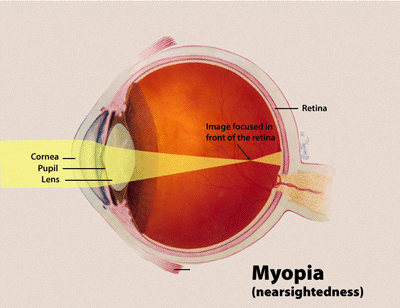Understanding Myopia and Hypermetropia, at Shekar Eye Hospital, we encounter numerous patients confused between myopia (short-sightedness) and hypermetropia (long-sightedness). Both are common vision conditions, yet they affect individuals in fundamentally different ways. This article aims to demystify these conditions, offering clear insights into their differences, causes, and treatments.
Myopia: A Closer Look at Short-Sightedness
Myopia, widely known as short-sightedness, is a condition where close objects appear clear, but distant ones blur. This happens when the eyeball is slightly longer than normal or when the cornea is too curved. As a result, light entering the eye isn’t focused correctly, landing before it reaches the retina.

Causes of Myopia
Factors contributing to myopia include genetics and lifestyle choices, such as extensive close work (reading, computer use) and limited outdoor activities. It is seen more commonly in children and teenagers, partly due to these habits and possibly due to rapid growth phases.
Treatment for Short-Sightedness
Glasses or Contact Lenses: The primary treatment for myopia involves corrective lenses that adjust the focus of light onto the retina.
Laser Eye Surgery: For a more permanent solution, procedures like LASIK can reshape the cornea, correcting the pathway of light into the eye.
Orthokeratology: Wearing rigid contact lenses overnight to temporarily reshape the cornea can provide day-long relief from myopia without needing glasses or contacts during the day.
Hypermetropia: Understanding Long-Sightedness
Hypermetropia or long-sightedness is the opposite of myopia. Here, you can see distant objects clearly, but struggle with close ones. This condition arises when the eyeball is too short, causing light to focus behind the retina instead of directly on it.
Causes of Hypermetropia
Hypermetropia can be present from birth, though it often becomes more apparent with age as the eye’s lens loses flexibility. Genetics play a significant role, and in older adults, this condition is part of natural aging.
Treatment for Long-Sightedness
Corrective Lenses: Similar to myopia, glasses or contact lenses are the simplest way to correct hypermetropia by altering how light is focused onto the retina.
Refractive Surgery: Surgical options are available to change the shape of the cornea, improving how light is focused and eliminating the need for corrective lenses.
Lens Replacement Surgery: In advanced cases, especially in older patients, replacing the lens of the eye can correct long-sightedness.
Understanding Myopia and Hypermetropia
Understanding the key differences between these conditions is crucial for seeking the correct treatment. Myopia (short-sightedness) means difficulty seeing far away, while hypermetropia (long-sightedness) means issues with seeing up close. The root cause of both involves how light is focused inside the eye, but in opposite manners.
Prevention and Management
While genetics play a significant role in both conditions, lifestyle adjustments can help manage or even prevent their progression. Encouraging children to spend more time outdoors and take regular breaks during close work can help. Regular eye exams are essential to detect changes in vision, ensuring timely intervention.
Choosing Shekar Eye Hospital for Treatment
At Shekar Eye Hospital, we specialize in diagnosing and treating both myopia and hypermetropia. Our experienced professionals are committed to providing personalized care. From the initial consultation to choosing the right treatment plan, including glasses, contact lenses, or surgery, we ensure each patient receives the best possible outcome for their vision needs.
Myopia and hypermetropia affect millions of individuals worldwide, influencing their quality of life. Understanding these conditions, their causes, and the available treatments empowers individuals to seek the help they need. At Shekar Eye Hospital, we are dedicated to guiding our patients through their journey to clearer vision, offering comprehensive care for short-sightedness and long-sightedness.
If you are experiencing vision problems, don’t hesitate to reach out. Let us help you see the world more clearly.








